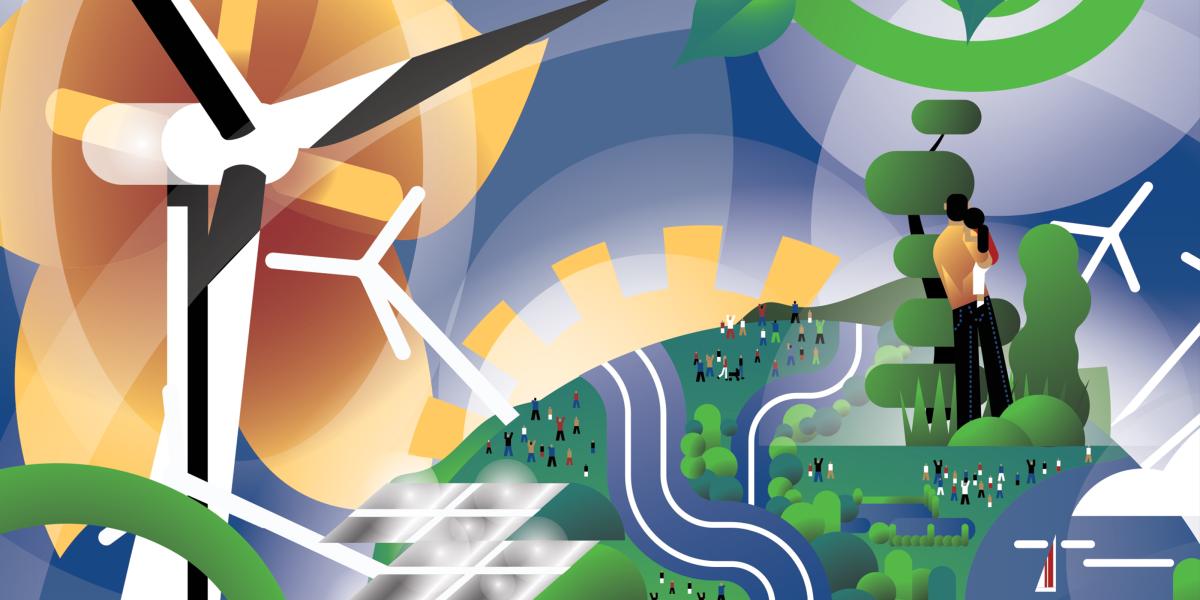The Case for Planetary Health
The choices we make today will determine whether we have a livable future.
We find ourselves actors in one of history’s greatest dramas.
The story began when a trick of evolution allowed a lone ape species to develop an exceptionally large and complex brain. These brains have allowed us to bend Nature toward our will, unlocking an abundance of energy and resources that have fueled almost unimaginable improvements in human development. In the last 75 years alone, life expectancy nearly doubled, and child mortality and extreme poverty fell by a factor of five.
But the same advances in science and technology that drove these gains are also accelerating our destruction of Nature. To feed ourselves, we claim 40% of the world’s land surface and nearly half its accessible fresh water. We have felled half the planet’s temperate and tropical forests. Pollution from our enterprises contaminates air, water, and soil. And we are changing the planet’s climate at a critical pace. Two-thirds of the birds, reptiles, amphibians, fishes, and mammals that used to share the planet with us are gone. A million species face extinction, many within the next several decades.
In pursuit of our ambitions, all of Nature has become collateral damage.
The field of planetary health tells us that these biophysical changes are interacting to erode the foundations of human well-being: the quantity and nutritional value of food we can produce, the quality of air and water, our exposure to infectious diseases and extreme weather events, and even the habitability of the places many of us live. Every dimension of human health is affected. The enormous health gains we have achieved over the last several decades are now threatened by our degradation of Nature’s life-support systems.
Nor are the health burdens distributed evenly or fairly. When warming brings malaria to the East African highlands, the poorest families who cannot purchase bed nets are most vulnerable. When pollinating insects decline and crop yields fall, the wealthy can purchase fresh fruits and vegetables while the poor suffer higher rates of heart disease, stroke, and certain cancers because they can’t afford to eat these foods. Consumption patterns and value systems of the wealthiest people put the poorest people and future generations in harm’s way. Indigenous knowledges that have long stressed our interdependence with natural systems have been marginalized or destroyed.
A million years of biological evolution and thousands of years of social evolution have brought us to this question: Can we change?
Here is where we find ourselves: Our cleverness may be our undoing. The same complex brains that subjugated much of Nature now recognize that the state of natural systems and the well-being of humanity cannot remain disconnected. People around the world are suffering. The wild, miraculous tapestry of life is coming unwoven. We are walking a charred path toward extinction.
As we awaken to the fierce urgency of this moment, we realize that our only way forward requires deep, rapid, structural change in how we live and a global commitment to protecting and regenerating Earth’s natural systems. This understanding holds enormous promise.
Looking out across global food systems, energy systems, manufacturing, urban design, and green chemistry, we find a rich landscape of solutions. We can imagine a world, a hundred years from now, where the human population has stabilized by educating girls, creating economic opportunities for women, and providing greater access to contraception. A world powered by renewable energy. A world where food and goods are produced with dramatically reduced ecological inputs. And a world where most of us live in cities that optimize physical, mental, and cultural health, while allowing Nature to regenerate. In this world, each passing decade offers more breathing room to the rest of the biosphere. It’s called the Great Transition—and every person in every place has a role.
A million years of biological evolution and thousands of years of social evolution have brought us to this question: Can we change? As we awaken to this moment, can we rise to its requirements? Can we find the humility, the compassion, and the courage to acknowledge the need for a different path and collectively embrace it? How will we answer the only question that matters: How shall we live?
A hundred years from now, this could be our story: Once upon a time, on a stunningly beautiful planet, a young species with a very large brain woke up to find itself imperiled by its narrow self-conception and shortsightedness. And with eyes opened, it charted a new course in which selfishness gave way to collectivism, domination and extraction were replaced with regeneration, and extinction became renaissance.
The choice is ours. What story will we write?
Listen to Myers read this essay on a special episode of Public Health On Call.
